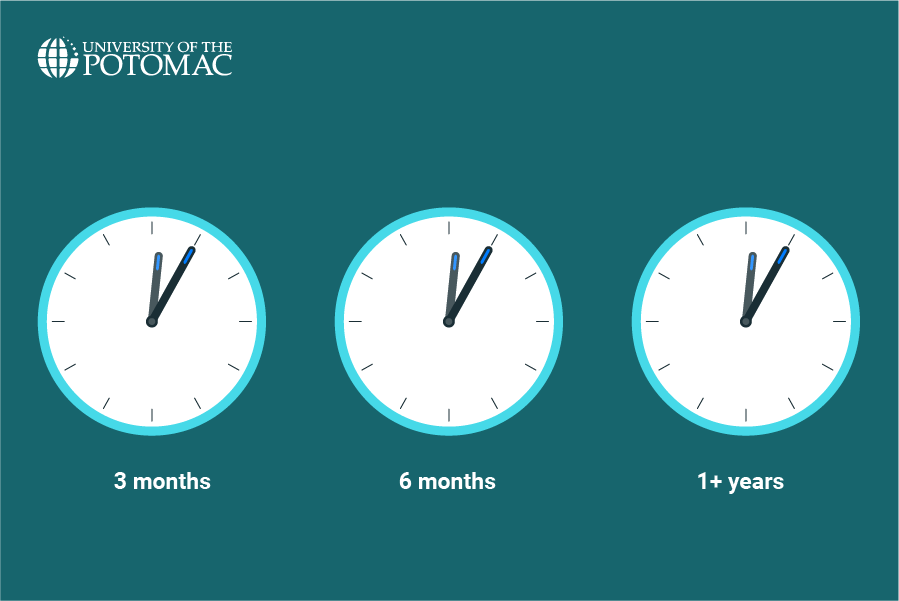Every day, we interact with different online services and applications that simplify our lives, from banking apps to social media platforms and e-commerce websites. The seamless experience we enjoy, with intuitive interfaces and reliable performance, is the result of meticulous work behind the scenes. Among the professionals who make all this possible are full-stack developers. Their expertise ensures that the applications we rely on are both user-friendly and reliable.
Given the significant impact of their work, you’d expect that becoming proficient in this field requires considerable time and effort. If you’re wondering, “How long does it take to become a full-stack developer?” then keep reading as we explain the typical timelines and the factors that can influence the duration of your journey. Pursuing a career as a full-stack developer is an excellent choice, but understanding the commitment involved is crucial for aspiring professionals.
What Is a Full-Stack Developer?
A full-stack developer is a highly versatile and exceptionally skilled professional proficient in both front-end and back-end development. These professionals are capable of handling all aspects of a web application, starting from the user interface to server-side logic and database management. In fact, the term “full-stack” refers to the complete set of technologies and tools required to build a fully functional web application. So, full-stack developers possess a thorough understanding of the entire web development process, making them invaluable assets to any development team.
These developers are often seen as the jack-of-all-trades in the software development world since they can encompass the work of both front-end and back-end developers. Thus, they help ensure the integration and smooth communication between these two sides of the development spectrum. Their broad skill set allows them to work on various aspects of a project, providing flexibility and adaptability in rapidly changing technological environments.
What Does a Full-Stack Developer Do?
Full-stack developers are responsible for developing and maintaining the client and the server side of web applications. Their duties can be broadly categorized into front-end and back-end development:
Front-end development
Front-end development primarily involves creating visually appealing and user-friendly interfaces that meet the end-users’ needs and expectations.
Full-stack developers use technologies such as HTML, CSS, and JavaScript to build responsive and interactive web pages. They work with various frameworks and libraries to enhance the functionality and aesthetics of the web application.
Back-end development
On the other hand, back-end development focuses on server-side logic, database management, and application functionality.
Full-stack developers use server-side languages such as Python, Ruby, Java, PHP, and JavaScript (Node.js) to build the backbone of the web application. They work with databases like MySQL, PostgreSQL, MongoDB, and others to store and manage data efficiently. Full-stack developers are also responsible for integrating APIs, ensuring data security, and optimizing the performance of the application.
Additional responsibilities
In addition to front-end and back-end development, these developers are also often involved in deploying and maintaining web applications. They use version control systems to manage code changes, collaborate with other developers, and ensure the consistency of the codebase.
In certain cases, they may even be responsible for setting up and managing servers, monitoring application performance, and troubleshooting issues as they arise.
How Long Does It Take to Become a Full-Stack Developer?

The path to becoming a proficient full-stack developer is highly personalized and varies widely among individuals. For many aspiring full-stack developers, the time needed to achieve proficiency often falls within three distinct ranges: three months, six months, or extending to a year and beyond.
The duration largely depends on individual circumstances, such as the student’s prior educational background and experience in related fields, preferred learning style, the complexity of projects they engage in, and the amount of time they can consistently dedicate to learning and practice.
Prior experience
If you already have experience in front-end or back-end development, you might only need a few months to learn the complementary skills and tools required for full-stack development. On the other hand, starting from scratch might take longer as you build a foundation in basic programming concepts before moving on to more advanced topics.
Previous exposure to related fields, such as a solid educational foundation in computer science or a related field, can significantly shorten the time required to become a full-stack developer. Such degree programs typically cover essential topics such as algorithms, data structures, databases, web development, and programming languages.
However, it’s also possible to enter the field through alternative routes, such as coding bootcamps, online courses, and self-study. These methods can provide intensive and focused training, often designed to equip you with the skills needed in a shorter period.
Learning style
Your preferred learning style can also impact the time it takes to become a full-stack developer. Some people thrive in structured environments like university courses or coding bootcamps, with a clear curriculum and support from instructors and peers. These programs can accelerate your learning process, often enabling you to become job-ready in three to six months.
Others may prefer self-paced online courses, which allow flexibility but may take longer depending on the individual’s dedication and consistency. Regardless of the chosen learning method, hands-on practice through building projects or contributing to open source is crucial.
Complexity of projects
The complexity of the projects you undertake during your learning journey can affect how quickly you become proficient. Starting with simple projects lets you grasp basic concepts and gradually build your skills. As you take on more complex projects, you’ll encounter real-world challenges that deepen your understanding and prepare you for professional work.
Working on diverse projects, such as creating interactive websites, developing full-featured web applications, or integrating third-party APIs, can significantly enhance your learning experience and accelerate your path to becoming a full-stack developer.
Time commitment
The time you can commit to learning and practicing also plays a crucial role in determining how long it will take to become a full-stack developer. For example, intensive coding bootcamps, which often require full-time commitment, can prepare you for a job in as little as three months. Whereas, if you are balancing learning with a job or other responsibilities, it might take much longer.
Consistency is key—regularly dedicating time to study, practice coding, and work on projects will help you make steady progress and achieve your goal more efficiently.
Full-Stack Developer Skills
To excel as a full-stack developer, one must possess the skills necessary to cover tasks for both front-end and back-end development. Some of the key skills include:
Proficiency in front-end technologies
A full-stack developer must be proficient in HTML, CSS, and JavaScript, the core technologies for building user interfaces. They should also be familiar with front-end frameworks and libraries such as React, Angular, and Vue.js. Knowledge of responsive design principles and cross-browser compatibility is essential to ensure a consistent user experience across different devices and platforms.
Interested in pursuing a degree?
Fill out the form and get all admission information you need regarding your chosen program.
This will only take a moment.
Message Received!
Thank you for reaching out to us. We will review your message and get right back to you within 24 hours.
If there is an urgent matter and you need to speak to someone immediately you can call at the following phone number:
- We value your privacy.
Expertise in back-end technologies
Full-stack developers must be skilled in server-side languages like Python, Ruby, Java, PHP, and JavaScript. They should have experience with databases such as MySQL, PostgreSQL, MongoDB, etc. Understanding server management, database design, and data modeling is crucial for developing robust and scalable back-end systems.
Familiarity with version control systems
Version control systems like Git are essential tools for full-stack developers. They enable developers to track code changes, collaborate with team members, and manage different codebase versions. Proficiency in using Git and platforms like GitHub or GitLab is important for maintaining an organized and efficient development workflow.
Knowledge of DevOps and deployment
Full-stack developers should have a basic understanding of DevOps practices and deployment processes. This includes knowledge of continuous integration and continuous deployment (CI/CD) pipelines, containerization technologies like Docker, and cloud platforms like AWS, Azure, or Google Cloud.
Problem-solving and analytical skills
Full-stack developers need to identify and resolve issues quickly, optimize application performance, and implement efficient solutions. Thinking critically and approaching problems from multiple angles is essential for success in this role, especially when facing complex and unforeseen challenges.
Communication and collaboration
Full-stack developers often work as part of a team, collaborating with front-end developers, back-end developers, designers, and project managers. Therefore, strong communication skills are essential for articulating ideas, discussing technical details, and providing feedback. Effective collaboration ensures all team members are aligned, which is crucial for the timely and successful completion of projects.
Time management and organization
Given the breadth of their responsibilities, full-stack developers must be adept at managing their time and staying organized. They often juggle multiple tasks, from coding and debugging to testing and deployment. Effective time management ensures that they can meet deadlines and maintain a high standard of work without becoming overwhelmed.
Wrapping Up
All in all, the journey to becoming a full-stack developer varies for each individual and is influenced by factors such as prior experience, learning style, project complexity, and time commitment. By understanding these factors and tailoring your approach accordingly, you can plan a realistic and effective path to gaining the skills and knowledge needed to excel in this field.
If you’re looking to accelerate your journey, consider enrolling in Potomac’s Computer Science degree program. The program provides the education and hands-on experience necessary to develop the essential skills required for full-stack development, potentially shortening the time needed to perfect your abilities. Committing to your education and working hard can set the stage for achieving proficiency in full-stack development faster than you might think.
Frequently Asked Questions (FAQs)
Can I learn to be a full-stack developer in 6 months?
Yes, it is possible to learn to be a full-stack developer in 6 months, especially if you are committed to intensive study and practice, such as through a coding bootcamp. However, the timeline can vary depending on your prior experience and the time you can dedicate to learning.
Is full-stack development hard?
Full-stack development can be challenging as it requires proficiency in both front-end and back-end technologies, along with continuous learning to keep up with evolving tools and frameworks. However, with dedication and the right resources, many find it a rewarding and achievable career.
Is being a full-stack developer a stressful job?
Full-stack development can sometimes be stressful, especially when managing multiple tasks and tight deadlines. However, many developers find the challenge stimulating and rewarding, and effective time management and problem-solving skills can help mitigate stress.
Do full-stack developers get paid well?
Yes, full-stack developers generally receive competitive salaries due to their versatile skill set and ability to handle both front-end and back-end development. Compensation can vary based on experience, location, and the specific demands of the job; however, it typically reaches six figures, with the average being $121,334 per year.










